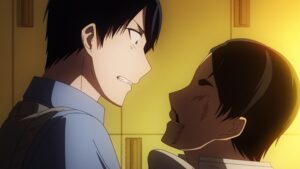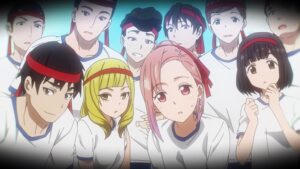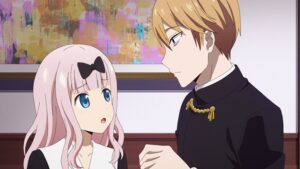Me two weeks ago: Ishigami has never been a more sympathetic character!
Me after watching episode 11: Looks like the honeymoon is over.
I don’t know how popular an opinion this is – my guess is “not very” – but I didn’t care for the flashbacks to Ishigami’s scarring middle school experience. I’d go so far as to call them distasteful, especially given the haste with which his character was plunged into despair, then rescued by an appearance from deus ex Shirogane. Prior to all this sports festival stuff, we were given a lengthy glimpse into Ishigami’s mind as he sat in the cheer club room, weighing his discomfort against his need to challenge himself socially. It took him a while to accept the decency of his fellow club members, which made sense even before we learned how big a pariah he was. That being the case, I wonder why such a hyper-dramatic history was necessary for his character. Couldn’t he have been a loner by nature, whose solitude caused one or two gossipy students to spread rumors about him? Wouldn’t his journey towards openness and acceptance be more rewarding if it weren’t rooted in such an obvious plot?
My issues here don’t stem from a belief that Kaguya-sama should be all comedy, all the time. “I Can’t Hear the Fireworks,” the two-part story that served as the first season’s emotional climax, was highly dramatic. It was also one of my favorite chapters, since it grounded Kaguya’s uncompromising personality in the dysfunction of her loveless family life, and gave her a cathartic breakthrough to boot. “Yuu Ishigami Closes His Eyes” attempts something similar by positioning Ishigami’s teenage trauma as the reason for his present day isolation, but it’s far less personal than its season 1 counterpart. We know nothing about his relationship with Kyoko, the nice girl from his ninth grade class, except that she is nice. Her boyfriend Kou’s personality starts and ends at “huge dick” – the scene where Ishigami beats him up can’t be called cathartic, because Kou’s character is so shallowly drawn that he’s not even hateable.
Really, the pity party that episode 11 threw for Ishigami had me scratching my head. After he’s through punching Kou and the fabricated stalker claims are made against him, the show places a staticky effect over the featureless faces of his onlooking peers. It’s a decision intended to highlight his shock at Kou’s lie and his classmates’ willingness to believe it, but the more shocking idea is that I’m supposed to be invested in this story. If Kyoko is so important to Ishigami that he’s willing to tap her cheating boyfriend’s phone, how about putting her on screen for more than 60 seconds before shit hits the fan? If her boyfriend is really as big a bastard as the show makes him out to be, why not supply some of the details Ishigami learned from the phone tap? I know that modern 12 episode series have to make the most of their limited runtimes, but when you’re attempting to do something big with a major character’s backstory, you have to put in more work than this.
I ought to stop this complain train here, but I feel obligated to point out how bad the follow-up to this flashback is. Ishigami’s refusal to apologize fits his character, so while his transformation into a hikikomori struck me as a bit much, it’s a reasonable extension of his prolonged absence from school. But the student council president coming to his house, bathed in light as though he were an angel, come to vindicate Ishigami’s actions? That’s a swan dive into Indulgence Lake. Seriously, rewatch the scene where Shirogane appears and look at the way he’s backlit. Think about the line, “I don’t intend to discuss whether your actions were right or wrong,” and tell me it’s not a cop-out. Scroll back to the scene where Kou gets the stuffing knocked out of him and listen to the sad violins that play, as though what’s happening is part of some Greek tragedy. I’m sure that the Ishigami fans out there loved this scene, but honestly, I regret having watched it.
Let’s quit while we’re behind and skip to the finale, which I actually liked. It starts with a story about a cell phone, which sounds kind of dreadful on paper, but accomplishes quite a bit in practice. “The Student Council Would Like a Group Photo” plays three roles: Kaguya spotlight, uplifting ensemble story, and victory lap for the show’s second season. The first of those roles is my favorite, since the shifts in Kaguya’s mood throughout the chapter highlight her ever-present insecurities, all without splitting her psyche into cartoon fragments. She begins the episode with a feeling of connectedness to her friends, achieved via the camera function on her flip phone, which she’s been using to document her life. When the phone breaks and her library of memories is lost, she retreats into herself like she’s done a hundred times before, not understanding that her friends care for her just as she cares for them. That mutual love is symbolized by the albums upon albums of photos that the other student council members share with Kaguya after she gets a smartphone – but the appeal of this chapter runs deeper than a simple metaphor.
What really makes it special are the photos themselves, or rather, their presentation. In flashing through Kaguya’s memory of her flip phone pics, we see key events from this season in reverse chronological order, as though time is being rewound in Kaguya’s mind. We start with Ishigami in drag for the cheerleading club (episode 9), move to the silly Instagram faces from Chika’s rule-breaking exercise (episode 8), then to the results of the student council election (episode 6), and so on. The way Kaguya tearfully suppresses her sadness here is bad enough, but when you realize that the show is “undoing” the events of the season in her mind, that denial reads less like a defense mechanism and more like a last lifeline. After she joins a shared album with her friends in the post-smartphone world, though, images from every point in the show’s timeline flood the screen. The chapter doesn’t end with a linear rebuilding of her social attachments, but rather a torrent of evidence that her friends treasure her, and always have.
The season-ending balloon game, by contrast, was just a bit of fun on which to end things – much like the spring cleaning story from season 1. Between the two closing chapters, I prefer this new one; the premise may be more outlandish, but the tone isn’t so ridiculous as to slap the characters’ heads on fighter planes for a laugh. (Does anyone remember that bit of weirdness from last year? I’m still fixated on it for some reason.) The big balloon explosion does provide some justification, however thin, for a fun credits scene where the supporting characters blast past the camera, frozen in particularly photogenic poses. That’s also an upgrade from the 2019 model, when non-stylized credits rolled as Kaguya chased Shirogane on a frame-saving loop for nearly 50 seconds. It’s worth pointing out – not for the first time – that this season of Kaguya-sama has been quite polished, especially when you consider the world-halting obstacle that the final phase of its production was up against.
Now that we’ve come to the end of its second year, I can safely say that Kaguya-sama’s visuals, characters, humor, and most everything else about it still appeal to me. But as a final note, I have to submit season 1 as the better of the two available choices. The sequel is missing two things in my eyes: a lengthy streak of great comedic episodes, and a climactic chapter on par with “I Can’t Hear the Fireworks.” Season 2 took stabs at both criteria, but delivered a couple clunkers in the middle (episodes 5 and 7 come to mind), and I’ve made my thoughts on Ishigami’s dramatic turn pretty clear as of this post. But these are just the opinions of one man – a man whose medium-sized brain has produced nearly 1400 words and needs to go to bed. Kaguya-sama’s current list of strengths looks much the same as it did in 2019, so I won’t be doing a wrap-up post or producing a semi-arbitrary score for season 2. Just know that I enjoyed my time with the show once again this year, and the series’ inevitable continuation will be on my list of anticipated anime in 2021. Thanks for reading.





Nothing you’ve said is wrong, and my head agrees with you about episode 11. It kind of feels like it was trying to do Hayasaka’s One Day Wooing to a backstory.
But if you weren’t hyped for “Urusai Baka”, then you probably had way too nice a high school experience.
I’d say my high school experience was less nice and more shallow. There was never a Baka I wanted to Urusai, so to speak, because I kept to myself as much as possible. Maybe that’s why I was bewildered by that scene instead of excited for it.
Of course, the thinness of Kyoko’s appearance at the Sports Festival didn’t help. She reappeared solely as a stone for Ishigami to step on as he made his way towards a healthier self-concept. He might as well have yelled “shut up” at a mean-spirited note she’d written him in middle school.
I don’t think Kyoko was very important to him in any way other than her being a nice person that didn’t deserve being cheated on. What I got from it was more that Ishigamis was shocked that things didn’t go his way even though he thought he was obviously in the right. He even said himself that his sense of justice was “childish”, he got baited in by the boyfriend who used his reaction to turn the tables on him. So he did something that he thought was supposed to be virtuous and he got punished hard for it
He tried to stand on principle and learned the hard way that it’s not easy if you aren’t sophisticated and smart about it. Could probably teach Ino a lesson or two about that
I like your interpretation a lot, but I don’t think the show was going for such a nuanced stance. The way it framed Ishigami’s actions was far too charitable: the weepy score during the assault scene, Kou’s seiyuu cranking the villainy up to 11, Shirogane’s reassurance to Ishigami that “you achieved your objective” during that triumphant home visit, etc. The lens you’re placing on it is much closer to what the anime should have used, IMO.
Ishigami’s line about having a staunch sense of justice as a kid immediately reminded me of Iino as I first watched the episode. The fact that he suffered for that inflexibility in the past is what drives his antagonism towards her, I think – when he looks at her, he sees his past self.